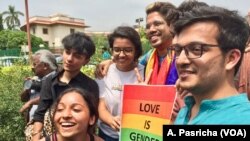Four years after India’s Supreme Court scrapped a law criminalizing gay sex, it has agreed to hear petitions seeking legal recognition of same-sex marriages, raising hopes of securing another significant right for the country’s LGBTQ community.
One of the two petitioners is a gay couple based in Hyderabad who held a commitment ceremony last December to cement their nearly decade long relationship.
Supriyo Chakraborty and Abhay Dang’s ceremony had all the trappings of a regular, colorful Indian wedding — the couple exchanged vows and rings and participated in a string of traditional rites along with their parents, relatives and friends.
The ceremony was important to them, especially for Chakraborty, for whom getting married had always been one of his childhood dreams.
“It was after the COVID-19 pandemic. We had both tested positive and after we recovered, suddenly we realized, what are we waiting for?” he told VOA.
But in real terms, the “wedding” ceremony did not change their status.
“We still can’t say we are legally married. On any public platform I cannot introduce Abhay as my husband. Marriage is important to an Indian family and I want my mother to be able to say that her son is married to Abhay,” said 32-year-old Chakraborty. “I have to still fill my status on all official forms as single, but I want the same rights and security that flow from legal marriages for straight couples. We don’t have any of that.”
Lack of legal recognition also leads to a host of hurdles for same-sex partners such as the right to make health care decisions for spouses or rights to inheritance. Chakraborty and Dang for example had to take out separate health care policies.
Besides Chakraborty and Dang, a Delhi-based gay couple, who said they have been in a relationship for 17 years, have also petitioned the top court for recognition of gay marriages. A batch of petitions on the same subject that are pending in lower courts will be transferred to the top court.
A bench led by chief justice D.Y. Chandrachud on Friday asked the government to file its response within a month.
Chandrachud, who took over as chief justice in November, is known for a string of progressive judgements on LGBTQ and women’s rights. In 2018, he was part of the five-judge bench that delivered the landmark judgement setting aside the colonial-era law criminalizing gay sex, calling it indefensible.
In August, he said the decision to decriminalize all consensual sex among adults must be accompanied by changes in attitude.
“Equality is not achieved with the decriminalization of homosexuality alone but must extend to all spheres of life including the home, the workplace and public places,” Chandrachud said at an event in New Delhi.
It remains to be seen what stance Prime Minister Narendra Modi’s Hindu nationalist Bharatiya Janata Party, whose support base includes many Hindus, takes on the sensitive issue of legalizing gay marriages.
Last year, the government told the Delhi High Court, which was hearing a petition on the same subject, that marriage necessarily depends upon “age-old customs, rituals, practices, cultural ethos and societal values,” and that same-sex marriages would "cause complete havoc with the delicate balance of personal laws in the country."
While some of Hinduism’s most ancient texts talk of same-sex relations as natural, homosexuality has long carried a stigma in India’s traditional society and for years most political parties have failed to make clear commitments on the issue of LGBTQ rights.
There has been a shift in attitudes among the urban middle classes in recent years, though. Some gay celebrities have come out openly about their orientation and Bollywood films based on stories exploring gay issues have been hits.
Chakraborty’s family is an example of the slow but growing societal acceptance.
“I belong to a very traditional family, but my story is not one of struggling to win acceptance,” he said.
“I came out to my mother after my partner Abhay told me I should do so. True, she was not very happy in the beginning, and it took her some time to understand and educate herself. But since then, she has been a pillar of support and I am really so proud of my parents.”
The Supreme Court’s decision to accept the petition seeking legalization of gay marriages marks the first step in a process that could take years, although LGBTQ rights advocates see it as a huge step in their struggle.
However, it is not a goal in itself, Manak Matiyani, a New Delhi resident and LGBTQ rights campaigner, said.
“I think everyone should have the freedom to get married if they want without discrimination. However, marriage should not be the only option to access rights such as inheritance, insurance nominations and bank account holdings. One should have the right to decide on these outside marriage also,” he said.
Most of the countries that recognize same sex marriages are in Europe or America — Taiwan is the only Asian country to do so.






